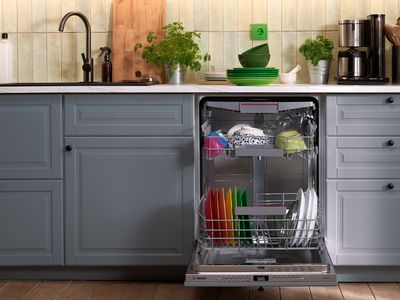Reasons a dishwasher beats washing up.
Dishwashers put the eco in economical. With all the water, electricity, time and money you’ll save in comparison to washing up by hand – especially when running the eco programme – the environment and members of your household will thank you for getting an appliance.
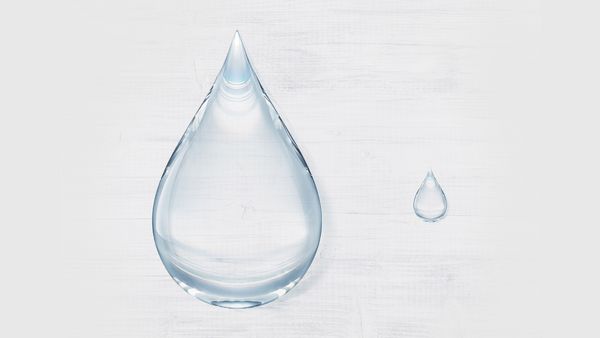
10 x less water than handwashing.
Do you imagine the inside of a dishwasher filled to the brim with sloshing water? Then you’ll be surprised by the appliance’s roughly 10-litre consumption. This low number is possible because a system of pumps, filters and spray jets recirculate the same water throughout the cleaning cycle. And because each jet fires under high pressure and at clever angles, it flushes nooks and crannies, removing tough stains.
By comparison, washing a pile of dishes of the same size by hand requires about 117 litres in a sink and even more if you’re washing up under a running tap. That's over ten times as much water! 1
1 Study published in SOFW Journal no. 3/2006 by the University of Bonn in which over 100 participants from various European countries handwashed 13 place settings.
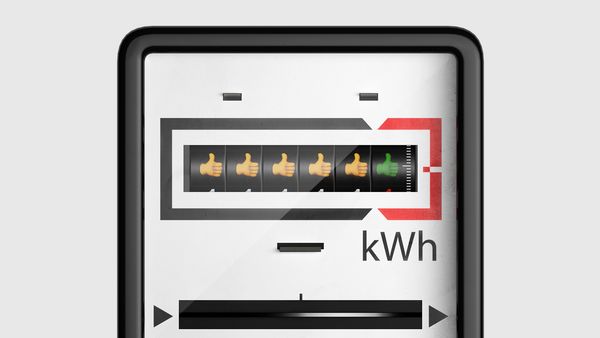
3 x less electricity than handwashing.
It's hard to believe that a machine, which plugs into an electrical socket, clocks up fewer kilowatt hours than old-fashioned elbow grease. The energy consumption question literally boils down to how the water is heated. Most newer dishwashers do the job more efficiently than a boiler. That’s partly because their lower water consumption means less heat energy is needed per load. We found that by the time you’ve filled up your sink and put on your rubber gloves, you’ve used 2.73 kWh energy, while a dishwasher’s power consumption is just 0.96 kWh per cycle – almost three times less. 2
2 Study published in SOFW Journal no. 3/2006 by the University of Bonn in which over 100 participants from various European countries handwashed 13 place settings.
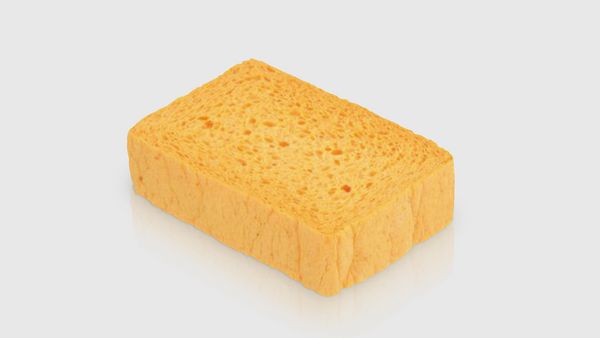
7 x times less bacteria than handwashing.
The murkiest part of the post-meal clean-up isn’t the dirty dishwater, but what’s lurking in the equipment you use. Sponges, scourers, dish towels and the sink itself – are breeding grounds for E. coli and salmonella. Although an appliance isn't a sterile environment, the water for washing is heated to a much higher temperature and the machine’s contents are in contact with the scalding stuff for longer. This kills 7 times more bacteria than washing up in the sink, making a dishwasher the more hygienic choice. 3
3 A comparison of the efficiency of manual and automatic dishwashers for the removal of bacteria from domestic crockery, published in the International Journal of Consumer Studies in July 2007.
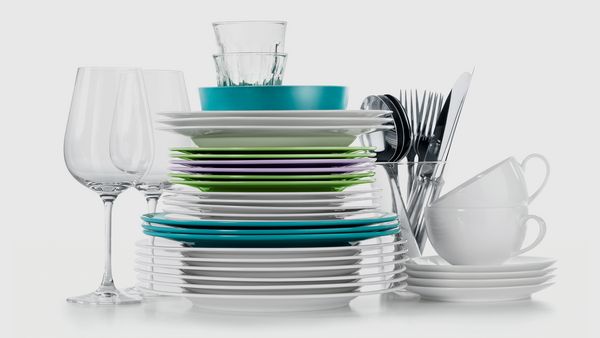
3 x more free time away from the dishes.
It takes about 15 minutes to stack and empty your dishwasher. When you roll up your sleeves to do the dirty work, you’ll be busy for about an hour. With a dishwasher in your household, you gain 45 minutes of free time with each load. That adds up to 210 hours each year – or a three-week holiday. 4
4 Internal Bosch research comparing doing dishes with a dishwasher versus hand-washing. 60 min (hand washing) - 15 min (with dishwasher) = 45 minutes savings per cycle *280 cycles per year (210 hours per year).
The pick of our dishwashers.
Dishwashing made better by Bosch.
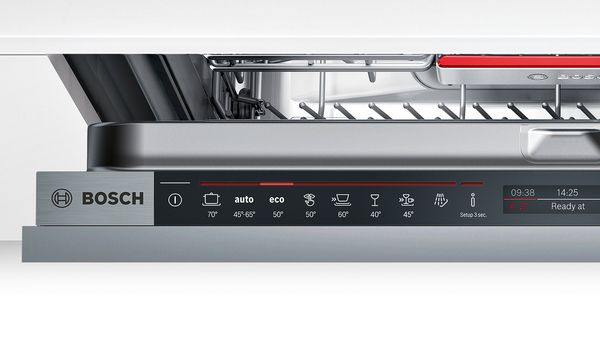
Less is more with Eco mode.
With a Bosch dishwasher, it’s easy to put your finger on the most sustainable choice. Just press the button to start Eco mode. This energy-saving programme only consumes up to half the electricity of Auto mode.⁵ Thanks to its longer wash cycle, the water doesn’t need to be as hot and the dishes soak for longer. The upshot is lower water and energy consumption.
With Eco mode, you'll be doing yourself and the environment a favour by making it one of your favourites.
5 Values may differ between models.
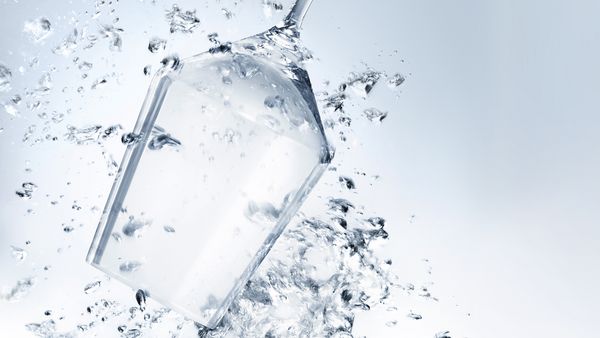
Giving dishes a carefully dosed dousing.
Our models with ActiveWater Eco take water-wise to new heights with a genius level H2O IQ. Thanks to the intelligent water-saving function, these machines produce perfectly clean, hygienic results with a mere 6.7 to 7.5 litres when running Eco mode. 6
6 Values may vary between models.
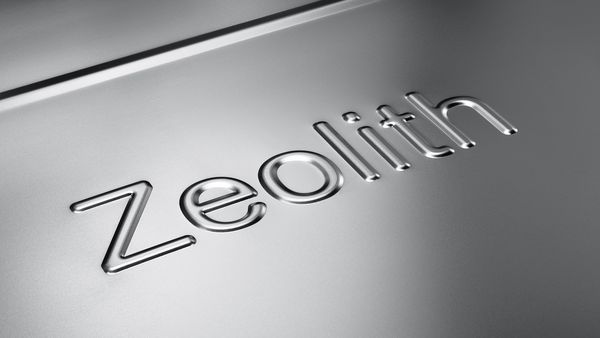
The mineral that rocks the drying process.
Drying your dishes requires heat. And to generate heat you need electricity, right? Not as much as you’d think. The reason is that Bosch dishwashers with PerfectDry use a mineral called zeolith, which extracts humidity from the air and releases heat in the process. Machines with this drying system use significantly less power. Best of all the process can be reversed by reapplying heat to release the stored water, so the zeolith never degrades or needs to be replaced.
Frequently asked questions about maximising dishwasher efficiency.
Water down the drain.
Don’t rinse your dishes before putting them in the machine. Not only is this a waste but it’s also counterproductive. For your machine and detergent to produce truly sparkling results, they need some dirt in the mix. Simply scrape excess food off each plate and your job is done.
Load up on efficiency.
Your machine is at its most economical when full. Otherwise, you’re consuming the same resources but getting fewer clean items at the end of the cycle. For this reason, appliance size and the number of place settings per load are important factors to consider in your choice of machine.
Hard (water) facts.
Descaling your dishwasher a few times each year is important, especially if you have hard water with a high mineral content. Tap water with lots of calcium and magnesium leaves white marks on glasses, unless you use rinse aid. Over time, similar deposits build up on heating elements and insulate them. As a result, your appliance uses more electricity to get the water to the appropriate temperature. Cleaning your machine ensures it operates as efficiently as when it was fresh out the box.
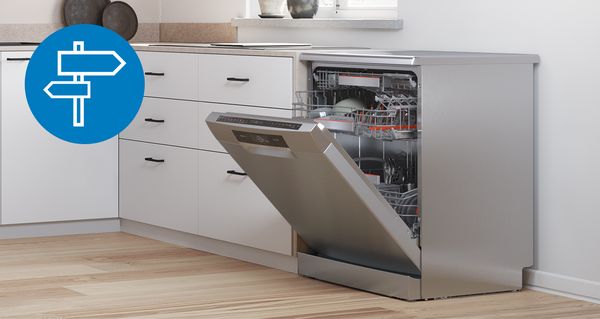
Find your love match.
The Dishwasher Finder serves up the appliance of your dreams on a silver platter. Just enter a few details about what you need and want; we provide the best product matches.
Start Dishwasher FinderWant to dive deeper into dishwashers?
- Is a freestanding dishwasher right for me?
- Is a built-in dishwasher right for me?
- Is a small dishwasher right for me?
- Like a pro: Tips for the first 100 days with your new dishwasher
- Dishwasher salt: what you should know
- All about using dishwasher tablets
- The lowdown on dishwasher rinse aid
- Need help with your appliance?
- Find a local dealer
